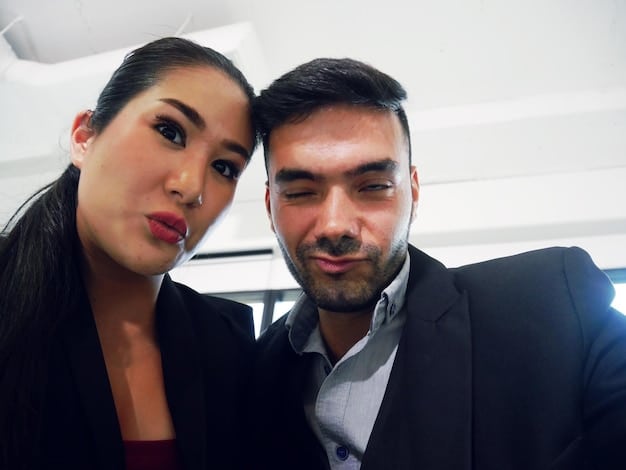Understanding Korean Workplace Culture: Tips for US Professionals in 2025

Understanding Korean Workplace Culture in 2025 is crucial for US professionals, encompassing hierarchical structures, communication styles, and social norms, which this article explores, providing practical tips for successful integration and collaboration.
For US professionals venturing into the South Korean job market in 2025, understanding the nuances of the local work culture is essential. This article aims to provide practical tips for navigating the unique aspects of **Understanding Korean Workplace Culture: Tips for US Professionals in 2025** ensuring a smoother transition and a more successful career.
Understanding Hierarchy and Seniority
Korean workplaces are typically characterized by a strong emphasis on hierarchy and seniority. This structure influences decision-making, communication styles, and even social interactions within the office. Comprehending this dynamic is paramount for US professionals seeking to thrive.
Respecting Your Seniors
Showing respect to your seniors (those older than you or with more experience) is a cornerstone of Korean workplace etiquette. This respect is demonstrated through both verbal and non-verbal cues. Addressing seniors with appropriate titles and using honorifics are essential.
Navigating Decision-Making
In many Korean companies, decisions are made from the top down. While input from junior employees may be considered, the final decision typically rests with senior management. Understanding this process can help US professionals manage their expectations and avoid potential frustration.
- Addressing colleagues by their titles is essential, typically “직위 + 님” (position + nim), for example, “과장님” (Section Chief nim).
- Always use both hands when giving or receiving something from a senior colleague as a sign of respect.
- Avoid directly disagreeing with a senior in a public setting. If you have concerns, address them privately and respectfully.
In conclusion, understanding and adapting to the hierarchical structure is vital for success in a Korean workplace. By showing respect for seniors and recognizing the decision-making processes, US professionals can build strong relationships and navigate potential challenges effectively.
Communication Styles and Etiquette
Communication in Korean workplaces can be more indirect and nuanced compared to what US professionals are accustomed to. Directness is often avoided to maintain harmony and prevent potential conflict. Mastering these communication styles is crucial for effective collaboration.

Indirect Communication
Koreans often prefer to communicate indirectly, relying on context and non-verbal cues to convey their message. Learning to read between the lines and understanding the underlying meaning is essential for effective communication.
The Importance of “Nunchi”
“Nunchi” (눈치) refers to the ability to gauge others’ moods and feelings through observation and context. Developing your “nunchi” can significantly improve your ability to navigate social and professional situations in Korea.
- Pay attention to non-verbal cues such as facial expressions, body language, and tone of voice.
- Be mindful of the context in which communication is taking place.
- Avoid being overly direct or confrontational, especially in public settings.
Mastering communication styles is vital for success in a Korean workplace. US professionals must be willing to adapt their communication approach and prioritize building rapport and trust with their Korean colleagues. Developing “nunchi” is also particularly important for navigating social dynamics effectively.
Building Relationships and “Inhwa”
“Inhwa” (인화), which translates to harmony, is a core principle in Korean culture and heavily influences workplace dynamics. Building strong relationships and maintaining a harmonious work environment are essential for achieving professional success.
The Significance of Company Dinners
Company dinners, or “hoesik” (회식), are a common occurrence in Korean workplaces and serve as an important opportunity for team bonding and relationship building. Participation is often expected and provides a chance to connect with colleagues on a more personal level.
Teamwork and Collaboration
Korean workplaces often emphasize teamwork and collaboration. Individual achievements are often downplayed in favor of collective success. Contributing to team goals and supporting colleagues are highly valued.

- Be proactive in building relationships with your colleagues.
- Participate in company social events and activities.
- Show a willingness to help and support your team members.
Building relationships and fostering “inhwa” is essential for success in a Korean workplace. Understanding and respecting the importance of team harmony allows US professionals to build trust and forge connections with local individuals, thus greatly enhancing their overall experience.
Adapting to Korean Business Culture
Korean business culture has distinct differences from Western norms. Showing cultural sensitivity and a willingness to learn can significantly enhance your professional relationships and overall experience in Korea.
Gift-Giving Etiquette
Gift-giving is a common practice in Korean business culture and can be a way to express gratitude or build rapport. However, it’s important to be aware of the appropriate etiquette when giving gifts.
Business Card Exchange
Exchanging business cards (명함, myeongham) is a formal ritual in Korea. Presenting and receiving cards with both hands and taking time to examine the card are considered essential etiquette.
- Gifts should be of high quality but not overly extravagant.
- Wrap gifts neatly and present them with both hands.
- When exchanging business cards, hold the card with both hands, with your name facing the recipient.
Adapting to Korean business culture requires a willingness to learn and understand local customs. US professionals must pay attention to the nuances of gift-giving, business card exchange, and meetings, as well as other cultural conventions. By displaying respect and adapting to local norms, individuals will be better positioned to thrive in this environment.
Understanding Attitudes Towards Work-Life Balance
Traditional Korean work culture often involved long hours and a strong emphasis on dedication to the company. While this is evolving, it’s important for US professionals to understand the prevailing attitudes towards work-life balance.
The Concept of “Overtime”
Working overtime is often seen as a sign of commitment and dedication in Korean workplaces. However, this can sometimes lead to an imbalance between work and personal life.
Evolving Attitudes
Attitudes towards work-life balance are gradually changing in Korea, particularly among younger generations. There is a growing emphasis on prioritizing personal well-being and spending time with family.
- Be aware of the potential for long working hours and plan accordingly.
- Respect your colleagues’ commitment to their work, even if it differs from your own approach.
- Advocate for a healthy work-life balance while being mindful of cultural norms.
Understanding cultural attitudes and how to navigate any potential work-life imbalances are crucial to successfully working within the Korean work structure. Even as attitudes evolve, professionals can strive for a more balanced approach while remaining respectful of local expectations.
Practical Tips for US Professionals in 2025
For US professionals preparing to work in Korea in 2025, there are several practical steps you can take to ensure a smooth transition and successful integration into the workplace.
Learn Basic Korean
Even a basic understanding of the Korean language can significantly enhance your ability to connect with colleagues and navigate everyday situations. Mastering greetings and essential phrases demonstrates respect and a willingness to learn.
Seek Cultural Training
Participating in cultural training programs can provide valuable insights into Korean culture, customs, and etiquette. These programs can help you avoid potential misunderstandings and build stronger relationships with your colleagues.
- Enroll in a Korean language course.
- Research Korean culture and business etiquette online.
- Seek mentorship from experienced professionals who have worked in Korea.
Having a grasp on the language and demonstrating a willingness to connect is useful. Actively seek out training and mentorship so you can thrive and grow your career while overseas.
Conclusion
Navigating the nuances of Understanding Korean Workplace Culture: Tips for US Professionals in 2025 requires a blend of respect, adaptability, and a willingness to learn. By embracing the cultural differences and implementing the practical tips discussed in this article, US professionals can thrive in the South Korean job market and build successful, rewarding careers.
| Key Aspect | Brief Description |
|---|---|
| 🧑🤝🧑 Hierarchy & Seniority | Respecting seniors is crucial; decisions are often top-down. |
| 🗣️ Communication | Indirect; understand “nunchi” (reading the room). |
| 🤝 Relationships (“Inhwa”) | Harmony is key; participate in “hoesik” (company dinners). |
| 🎁 Gift Etiquette | High-quality gifts are appreciated; present with both hands. |
Frequently Asked Questions
▼
“Nunchi” is the Korean art of understanding others’ moods and feelings. It’s crucial for navigating social situations and building strong relationships in the workplace by being perceptive and adaptable.
▼
Company dinners (“hoesik”) are very important for team bonding and building relationships. Participation shows commitment and provides a chance to connect with colleagues outside of the usual work setting.
▼
Gifts should be high-quality but not too extravagant. Presentation is important; wrap gifts neatly and present them with both hands as a sign of respect and gratitude.
▼
Address seniors with their titles, use honorifics, and show deference in communication and actions. Avoid direct disagreement in public and always use both hands when giving or receiving items.
▼
While not always mandatory, learning basic Korean is highly beneficial. It demonstrates respect, enhances communication, and facilitates better relationships with colleagues, improving your overall experience.
Conclusion
Understanding Korean workplace culture is essential for US professionals in 2025. By respecting hierarchy, mastering communication nuances, fostering relationships, and adapting to business etiquette, you can thrive in this dynamic environment. A willingness to learn and integrate will pave the way for a successful and rewarding career in South Korea.





